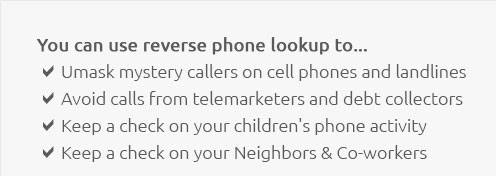 |
 |
 |
|---|
 |
 |
|---|---|
|
|
 |
|
|---|---|
 |
 |
 |
 |
 |
 |
|---|---|
 |
|
Understanding White Pages Reverse Phone Search: Important ConsiderationsIn today's interconnected world, the ability to unearth information with just a few clicks is taken for granted, yet among the myriad digital tools available, the White Pages reverse phone search stands out as a particularly intriguing resource. This tool, often understated in its utility, serves a niche yet significant purpose: helping individuals uncover the identity behind an unknown phone number. While at first glance, the concept may appear straightforward, a deeper exploration reveals a tapestry of considerations worth pondering. First and foremost, let's delve into what exactly constitutes a reverse phone search. Unlike traditional phone directories where one starts with a name to find a number, reverse phone searches begin with the number. The White Pages, a household name in directories, offers this service, enabling users to input a phone number and receive details such as the owner's name, location, and sometimes additional information like addresses. However, the efficacy of this tool can be contingent upon several factors. One must consider the type of number being searched. Landlines, typically linked to a physical address, are more likely to yield comprehensive results in contrast to mobile numbers, which can present a challenge due to privacy regulations and the increased use of number portability. Furthermore, with the rise of VoIP (Voice over Internet Protocol) numbers and disposable phones, the waters can become even murkier. Next, the accuracy and recency of the data in the White Pages database play a crucial role. As with any directory, the information is only as good as the last update. While White Pages strives to maintain a current and accurate database, the dynamic nature of phone number allocations and user registrations means there is always a margin of error. Users should manage their expectations and understand that the results may not always reflect the most current data. Moreover, the ethical and privacy implications cannot be ignored. While the convenience of identifying an unknown caller is undeniable, it also raises questions about privacy rights and the potential for misuse. In an age where data privacy is increasingly prioritized, it's vital to strike a balance between curiosity and respect for personal boundaries. Users should be mindful of the reasons behind their searches and consider the potential impact of their actions.
In conclusion, while the White Pages reverse phone search is a powerful tool in the digital age, it demands a careful and considered approach. By understanding its capabilities and limitations, and by respecting the privacy of others, users can navigate this service effectively and ethically. As technology continues to evolve, so too will the tools at our disposal, challenging us to remain vigilant and responsible in our quest for information. https://play.google.com/store/apps/details?id=com.wpconnect&hl=en_US
Look up on more than 200 million phone numbers and find out who called with Whitepages Reverse Phone Lookup. Get detailed information on unknown callers, ... https://www.nationalcellulardirectory.com/white-pages/
Use our white pages reverse phone search to lookup people, phone numbers, addresses, and much more. https://www.whitepages.com/people-search
With Whitepages' people finder, you can conduct confidential searches by name to quickly find verified phone numbers, home addresses, email addresses, ...
|
|---|